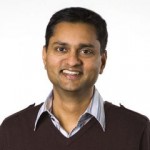 In addition to being an entrepreneur and VC, Anand Rajaraman is a computer science professor at Stanford with a trained eye for how new organizations can apply deep learning and other AI/ML techniques across various industries.
In addition to being an entrepreneur and VC, Anand Rajaraman is a computer science professor at Stanford with a trained eye for how new organizations can apply deep learning and other AI/ML techniques across various industries.
Having the opportunity to sit down with Anand, founding partner at over six organizations, and hear his perspectives on the current state of data and algorithms in the VC landscape, was time well spent.
M.R. Rangaswami: How are big data and algorithms transforming the VC landscape?
Anand Rajaraman: While VC-funded companies have disrupted many industries, it is perhaps ironic that the VC industry itself has not changed much in the past decades. Most VC firms find their deals through their networks. Since networks are local, this model works very well when a VC is focused on a single geography, such as Silicon Valley. However, in the past decade, we have seen rapid growth in the number of tech startups in many geographies around the world, across continents — Asia, Europe, and Latin America.
The network-driven model of sourcing deals does not scale across geographies. At the same time, there has been an explosion on the volume of “data exhaust” that companies produce. For example, downloads of apps, visits to websites, social media, team, investors — all these are visible in the data. Thus, the next stage in the evolution of Venture Capital is using all this data to source and evaluate deals across geographies. My firm Rocketship VC pioneered this approach. We have accumulated over 35 terabytes of data on the startup ecosystem, and update a million data points every day. We run sophisticated Machine Learning models on this vast trove of data to identify promising startups. We have used this approach to build a portfolio of over 35 companies all over the world — US, Europe, India, and Brazil. The performance of our Fund to date compares favorably with that of the top 20 VC firms in Silicon Valley.
M.R.: You have a blog called Datawocky, where the motto is “more data (usually) beats better algorithms.” Can you elaborate on what that means?
Anand: Marc Andreessen famously said, “Software is eating the World.” We live in an era where software, powered by algorithms and AI, is transforming industries, the sciences, and society as a whole. On closer inspection, however, it is apparent that data is the fuel that powers software’s conquests. The efficacy of AI and Machine Learning algorithms is only as good as their training data. In most cases, the actual algorithmic techniques are a commodity, available to all companies; and there are platforms and tools that lower the algorithmic entry barrier. The real differentiator between companies is their data sets rather than their algorithms. Successful companies create virtuous loops where use of their software generates even more training data. Over time, this virtuous loop creates a much bigger barrier to entry and competition than their algorithms ever can. Competitors can copy your algorithms, but not your data. That’s why more data always beats better algorithms (in the long run).
M.R.: What advice do you have for startup founders who are looking for VC funding?
Anand: The first thing I always tell would-be founders is to find a co-founder. Being a founder is very draining both physically and emotionally, and there are many ups and downs along the way. Having a co-founder greatly increases the odds of success. Also, founder chemistry is super-important — it is the one thing both founders and VC’s often underestimate, but a leading cause of failure. Founder chemistry can only truly be tested during tough times. So it is ideal to have a co-founder you have worked with in the past, either in a company or in an academic settings (e.g., on research projects).
